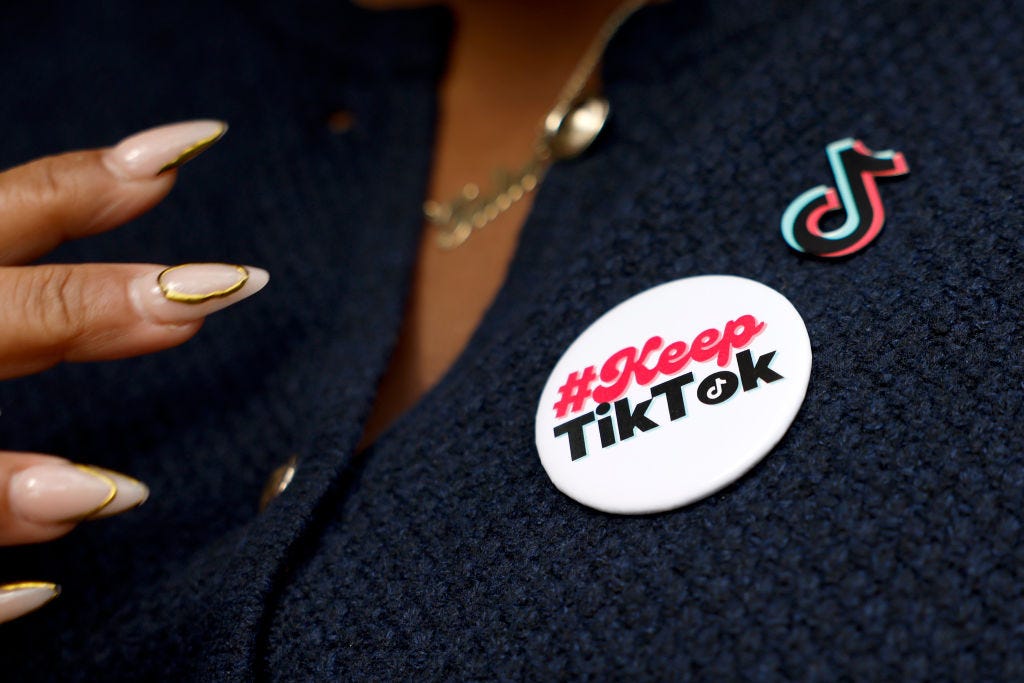
It’s Tuesday, September 17—Happy Constitution Day! This is The Front Page, your daily window into the world of The Free Press—and our take on the world at large. Today: ‘Why did journalists like me take Ryan Routh seriously?’; the lesson from the winner of the streaming wars; au revoir to the EU’s anti–big tech censor; and much more.
But first: Yuval Levin and Martin Gurri on our political maladies—and how to cure them.
When Donald Trump was shot in the ear in July, some wondered whether coming millimeters from disaster might shock the country out of our political rancor. But any prospect of a silver lining to the tragedy in Butler, PA, quickly vanished. Yes, Joe Biden gave an Oval Office address about “lowering the temperature,” but it never felt like more than lip service, and everyone soon slipped back into their bad habits.
Will Sunday’s apparent assassination attempt be any different? It doesn’t look like it. Yes, politicians have issued cursory condemnations of political violence, but there’s also been plenty of victim blaming and scant sign of any real soul-searching about the tenor of our politics.
So what could fix our politics? Today, on Constitution Day and with the political debate approaching its election-season fever pitch, we bring you two stories about the state of our politics and what can be done to improve it.
For Yuval Levin, the solution to our problems lies in the document signed on this day 237 years ago, starting with its first word: We. Yuval, a brilliant conservative thinker as well as one of the smartest and fairest observers of the political scene, argues that Americans now struggle to talk about the country in the first-person plural. “Politically engaged Americans spend a lot of time talking about ‘them,’ ” he writes, “and very little time actually talking to or with people with whom we disagree. We are so divided we just can’t imagine we belong together.” But don’t despair about all the disunity, says Yuval. After all, the Constitution itself was written with disagreement in mind. And in a free society, “unity doesn’t mean thinking alike; unity means acting together.”
Read Yuval Levin’s prescription to heal the disease of disunity: “We Are Still ‘We The People’. ”
For Free Press columnist Martin Gurri, the problem with our political system is that too many have invested too much meaning in it. To those fretting that our democracy is in mortal danger, Martin’s first piece of advice is: Calm down. Why? “We can’t lose our democracy because we never had one.” What we have is representative government, and its undemocratic characteristics are a feature, not a bug: safeguards against many types of tyranny.
The real problem, Martin argues, is a much deeper malady. People have turned away from the sources of meaning in the private sphere—faith, community, and neighborhood—and gone searching for their substitute in politics. Here’s Martin:
Hungry for a loftier state of being, many somehow imagine they have found it in bashing the dull machinery of representational government. These seekers have mistaken Leviathan for God, the will to power for the state of grace—and, by exalting political action almost literally to heaven, they have succumbed to what might be called the transcendental temptation. Only politics, they believe, can save the earth. Only politics can establish social justice. Only politics can preserve the “normies” from the pedophiles who run the country.
As it happens, they are demanding personal validation from an institution explicitly designed not to provide it.
Read Martin’s bracing essay on how to save ourselves from the fanatics: “Mistaking Politics for Religion.”
“Why Did Journalists Like Me Take Ryan Routh Seriously?”
In yesterday’s Front Page my colleague Tanya Lukyanova revealed the astonishing news that she had interviewed Trump’s suspected would-be assassin. Once the news had sunk in, she learned of his criminal record, which was plain for the world to see. Tanya wondered why she, and other journalists who interviewed Routh, never questioned the zealotry of a man who had no military background or connection to Ukraine and yet moved thousands of miles to a war-torn nation to recruit foreign soldiers. In an essay for The Free Press she asks: “Why Did Journalists Like Me Take Ryan Routh Seriously?”
Joe Biden said Sunday’s apparent attempt on Trump’s life is a sign that the Secret Service “needs more help.” On the Hill, Senate Majority Leader Chuck Schumer said Democrats would be willing to provide extra funding for the agency. The Secret Service said Monday that the shooter did not have a line of sight on Donald Trump and did not fire his weapon. According to cell phone data obtained by the FBI, Ryan Routh was in the vicinity of the golf course for 12 hours on Sunday. Writing for Discourse, security expert Michael J. Ard says the episode in West Palm Beach is a needed win for the Secret Service, but adds that Biden should still up the protection for both Trump and Harris.
Routh laughed and smiled during a brief court appearance Monday. A former volunteer for Ukraine’s International Legion said Routh—who claimed to assist international volunteers fighting for Ukraine—was “delusional and a liar.”
Ann Arbor police are investigating an incident from Sunday, when a group of “unknown males behind him” reportedly asked a 19-year-old male student at the University of Michigan if he was Jewish, then knocked him to the ground, kicked him, and spat on him when he answered yes. He suffered minor injuries that did not require hospitalization. A federal report in June found the University of Michigan’s response to antisemitism on campus to be lacking. It’s no wonder Jewish students feel unsafe.
The Cuban regime cut the size of its subsidized ration of daily bread by a quarter, from 80 grams to 60 grams (2.1 oz). It is the latest sign of Cuba’s economic woes. Another: the million Cubans who fled the island between 2022 and 2023.
On Monday, a federal court heard arguments from TikTok that a forced sale or ban would violate U.S. users’ free speech rights. In April, Congress passed a law forcing the company to either shut down or sell to a non-Chinese owner by January 19. It’s not clear how selling TikTok to a U.S. owner would threaten Americans’ free speech. “The core point we’re making is one they’ve conceded,” said Daniel Tenny, a lawyer representing the U.S. government, “which is that TikTok’s code is made in China.” ICYMI: Watch a Free Press debate: Is Banning TikTok a Mistake?
The overwhelming majority of voters say Taylor Swift’s endorsement for Kamala Harris won’t affect how they vote in November. While 81 percent said they weren’t swayed by the pop star, six percent said they are now more likely to vote for Harris and 13 percent said it made them less likely to vote for the vice president. The 13 percent were casually cruel for the sake of being honest.
Listen and watch our last debate now—and book tickets for our next debate in New York.
If you missed last week’s debate in D.C. on the American dream, the video is now available for paid subscribers to watch here. And—because we’re feeling generous—the rest of you can listen to it on Honestly. Click below to hear Tyler Cowen, David Leonhardt, Katherine Mangu-Ward, and Bhaskar Sunkara duke it out over whether or not the American dream is alive and well.
And if you’re a Free Press reader in the New York area, listen up! Now’s the time to book tickets for the fourth and final installment of our America Debates series.
On October 9, in partnership with the Foundation for Individual Rights and Expression (FIRE), four of the sharpest minds in foreign policy will be debating: Should the U.S. still police the world? It’s a pressing question, given the current conflicts in Ukraine and Gaza, post-9/11 wars in Iraq and Afghanistan, and U.S. adversaries like China and Iran looming ever larger.
Arguing yes will be New York Times columnist Bret Stephens and Air Mail writer-at-large James Kirchick. Arguing no: Racket News founder Matt Taibbi and investigative reporter Lee Fang. Moderating proceedings? Bari Weiss, of course!
Click here for more information, or if you don’t need any more persuading, click here to buy your tickets. (And don’t miss the chance to attend the debate after-party, where you’ll be able to chat with Bari and members of the Free Press and FIRE teams, mingle with the debaters, and meet other subscribers in the flesh. To attend the after-party, be sure to purchase a Tier 1 ticket.)
Au Revoir, Thierry!
Thierry Breton, the EU’s internal-market commissioner, quit abruptly yesterday. Breton appears to have flounced out amid horse trading over jobs as European Commission president Ursula von der Leyen assembles a team for her second term.
We last encountered Monsieur Breton a month ago, when he was trying to censor American speech by writing a threatening letter to Elon Musk ahead of the X CEO’s interview with Donald Trump on the platform. “It’s a good day for free speech,” said X CEO Linda Yaccarino in response to Breton’s departure. We agree. . . to a point. Yes, Breton was a censorious bureaucrat seemingly set on punishing U.S. tech companies—and in particular those that took a stand for free speech. But sadly, Brussels is full of plenty of other unelected, trigger-happy regulators waiting in the wings to pick up where Breton left off.
How FX Bucked the Trend—And Won Big
FX was the big winner at Sunday night’s Emmys. One of its shows, Shogun, won a record-breaking eighteen Emmys. Another, The Bear, won eleven. In total, FX won 36 awards Sunday, easily outperforming its bigger, better-funded rivals like HBO and Netflix. It’s the latest victory lap for FX—and vindication for Disney, who acquired FX from Fox in 2019 and bundled it on the Hulu streaming app. It’s also a triumph for John Landgraf, the CEO of FX Networks, who is known as “the mayor of TV” and coined the term peak TV.
How did he do it? I asked The Free Press’s Joe Nocera, a long-time business journalist, for his take.
John Landgraf has a secret that other television network executives never seem to learn. While his competitors keep churning out lots of “content”—much of it mediocre or worse—the president of FX is laser-focused on producing fewer, but better, shows. He’s been that way for the entire 20 years he’s been the FX boss, and it’s been a remarkable formula.
Shogun and The Bear are top of mind after their Emmy haul on Sunday, but before them came shows like The Americans, (my pick for the greatest show ever), The Shield, Sons of Anarchy, Fargo, Reservation Dogs, and on and on and on. He recently told The Hollywood Reporter that his approach has been to focus on “people and conversations and ideas rather than frantically chasing after a frothy marketplace” like, well, Netflix.
After Disney bought Fox, it moved the FX shows to the Disney-controlled Hulu streamer, but otherwise left Landgraf and his team to do their thing, making viewers like me very happy. Over the years, Landgraf has given plenty of interviews outlining his philosophy and criticizing his rivals. This Q & A with The Hollywood Reporter is a good recent example. And check out this list of the 30 greatest FX shows, which I mostly agree with. (How can Justified be as low as number five?)
Oliver Wiseman is a writer and editor for The Free Press. Follow him on X @ollywiseman.
To support The Free Press, become a paid subscriber today:
And if you’re enjoying The Front Page, consider forwarding it to someone else you think might like it.










One way to lower the temperature would be for deranged leftists to quit shooting at Trump, and for left-wing politicians to stop comparing Trump to Hitler and calling him an existential threat to Their Democracy.
Just a suggestion! No need to “both sides” this.
At least Americans can count on the Babylon Bee to report the biggest ongoing news story (which TFP, and their fellow 'journalists' don't seem to care about):
KAMALA SAFE AND IN STABLE CONDITION AFTER ATTEMPTED INTERVIEW.